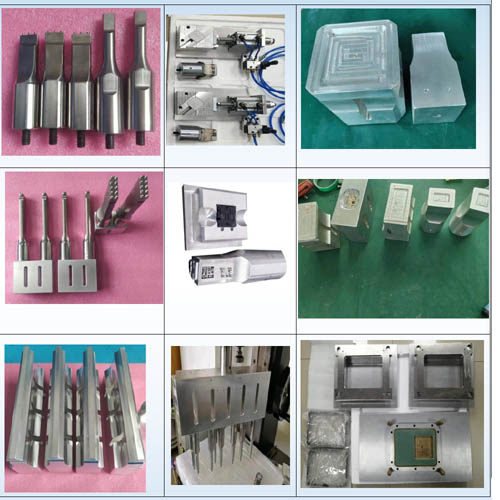Ultrasonic Molds Production

Product Welding Requirements: According to the welding requirements of the product, analyze the lifespan of the ultrasonic mold and decide whether to use aluminum alloy or titanium alloy to make
the ultrasonic plastic mold. Product Shape Design: Determine the specifications of the ultrasonic mold,
pressure transmission area, and the welding process to be used based on the welding technique.
Consider potential deformations during fusion, required ultrasonic welding machine power, and
whether the welding needs to be completed in one step or two.
Product Material: Determine the working amplitude of the ultrasonic mold, which part of the
workpiece will receive ultrasonic energy, the form, position, and size of energy transmission lines.
Also, design melt flow channels and welding surfaces for different combinations of plastic materials.
Ultrasonic Mold:
In the production of ultrasonic plastic welding molds, the following factors need to be considered
comprehensively:
Product Requirements: Determine the mold's lifespan and wear rate to decide which metal to use.
Product Shape: Determine the welding process, set the mold dimensions, pressure transmission area,
account for potential deformations during fusion, required power, and functionalities.
Material Selection for Ultrasonic Mold: The material chosen for the ultrasonic mold significantly
affects its lifespan compared to the welded product. The mold design process is complex. Material
selection is crucial not only for mold engineers but also for the product itself to meet its requirements
and avoid negligence that could affect efficiency and quality.
Each 3D design of the welding heads undergoes finite element analysis, and finished products are
rigorously tested using analysis instruments to ensure the uniformity of ultrasonic welding head
amplitudes. To effectively suppress lateral vibrations of the ultrasonic mold, it's necessary to calculate
the longitudinal and lateral resonance frequencies using frequency equations. Slots should be cut in
regions with lateral vibrations close to the mold's longitudinal vibration fundamental frequency.
Slot placement should coincide with the nodes of the lateral vibration mode. Slot dimensions must
be chosen reasonably to effectively suppress strong lateral vibrations. This will help to control lateral
vibrations of large tools and improve the displacement distribution uniformity of the ultrasonic
mold's sound radiation surface. It will also enhance the longitudinal efficiency of the ultrasonic vibration
system and achieve the desired ultrasonic welding effects.
Heat Treatment: Heat treatment of the metal mold for ultrasonic welding is as important as material
selection, as a stable heat treatment process ensures efficiency and wear resistance. Each welding
head's heat treatment process is meticulously recorded, and high standards are placed on heat treatment
requirements.
Customization of Ultrasonic Welding Fixtures: Ultrasonic welding fixtures can be customized according
to customer requirements. Simply provide drawings or product specifications, and the fixtures can be
designed and manufactured accordingly. Additionally, we offer spare parts processing based on product
parameters provided by customers: We design and process based on customer-provided drawings, samples,
or functional requirements.
Phone: +86-15989541416
E-mail: michael@sztimeast.com
Whatsapp:+86-15989541416
Add: 3/F, Building 5,Huixin Intelligent Industrial Park, Xinhu, Guangmin, Shenzhen,China 518107